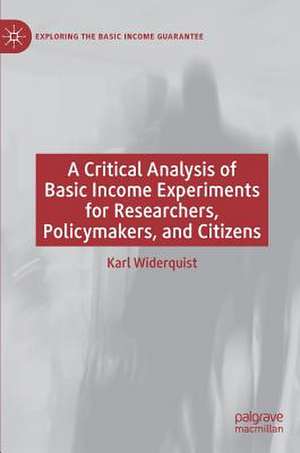A Critical Analysis of Basic Income Experiments for Researchers, Policymakers, and Citizens: Exploring the Basic Income Guarantee
Autor Karl Widerquisten Limba Engleză Hardback – 12 ian 2019
Din seria Exploring the Basic Income Guarantee
-
 Preț: 390.63 lei
Preț: 390.63 lei - 18%
 Preț: 727.18 lei
Preț: 727.18 lei - 15%
 Preț: 643.34 lei
Preț: 643.34 lei - 15%
 Preț: 635.15 lei
Preț: 635.15 lei - 15%
 Preț: 642.51 lei
Preț: 642.51 lei - 15%
 Preț: 637.46 lei
Preț: 637.46 lei - 15%
 Preț: 700.61 lei
Preț: 700.61 lei - 15%
 Preț: 643.34 lei
Preț: 643.34 lei - 15%
 Preț: 641.71 lei
Preț: 641.71 lei - 15%
 Preț: 640.06 lei
Preț: 640.06 lei - 15%
 Preț: 581.65 lei
Preț: 581.65 lei - 11%
 Preț: 518.13 lei
Preț: 518.13 lei -
 Preț: 478.53 lei
Preț: 478.53 lei - 15%
 Preț: 640.71 lei
Preț: 640.71 lei - 18%
 Preț: 1567.84 lei
Preț: 1567.84 lei - 18%
 Preț: 726.06 lei
Preț: 726.06 lei - 15%
 Preț: 690.29 lei
Preț: 690.29 lei - 15%
 Preț: 692.24 lei
Preț: 692.24 lei - 18%
 Preț: 996.91 lei
Preț: 996.91 lei - 18%
 Preț: 783.20 lei
Preț: 783.20 lei -
 Preț: 312.30 lei
Preț: 312.30 lei -
 Preț: 345.50 lei
Preț: 345.50 lei -
 Preț: 320.20 lei
Preț: 320.20 lei - 18%
 Preț: 787.29 lei
Preț: 787.29 lei - 15%
 Preț: 639.25 lei
Preț: 639.25 lei - 15%
 Preț: 641.71 lei
Preț: 641.71 lei
Preț: 485.61 lei
Nou
Puncte Express: 728
Preț estimativ în valută:
92.95€ • 95.78$ • 78.47£
92.95€ • 95.78$ • 78.47£
Carte tipărită la comandă
Livrare economică 03-17 martie
Preluare comenzi: 021 569.72.76
Specificații
ISBN-13: 9783030038489
ISBN-10: 3030038483
Pagini: 159
Ilustrații: XI, 167 p.
Dimensiuni: 148 x 210 x 11 mm
Greutate: 0.37 kg
Ediția:1st ed. 2018
Editura: Springer International Publishing
Colecția Palgrave Pivot
Seria Exploring the Basic Income Guarantee
Locul publicării:Cham, Switzerland
ISBN-10: 3030038483
Pagini: 159
Ilustrații: XI, 167 p.
Dimensiuni: 148 x 210 x 11 mm
Greutate: 0.37 kg
Ediția:1st ed. 2018
Editura: Springer International Publishing
Colecția Palgrave Pivot
Seria Exploring the Basic Income Guarantee
Locul publicării:Cham, Switzerland
Cuprins
Chapter 1. Introduction.- Chapter 2. Universal Basic Income and its More Testable Sibling, the Negative Income Tax.- Chapter 3. Available Testing Techniques.- Chapter 4: Testing Difficulties.- Chapter 5: The Practical Impossibility of Testing UBI.- Chapter 6: BIG Experiments of the 1970s and the Public Reaction to Them.- Chapter 7. New Experimental Findings 2009-2013.- Chapter 8. Current Experiments.- Chapter 9. Why are UBI Trials Happening Now? The Political Process That Brought About UBI Experiments in the 20-Teens.- Chapter 10. The Vulnerability of Experimental Findings to Misunderstanding, Misuse, Spin, and the Streetlight Effect.- Chapter 11. Why UBI Experiments Cannot Resolve Much of the Public Disagreement About UBI.- Chapter 12. The Bottom Line.- Chapter 13. Identifying Important Empirical Claims in the UBI Debate.- Chapter 14. Claims That Don’t Need a Test.- Chapter 15. Claims That Can’t be Tested with Available Techniques.- Chapter 16.Claims That can be Tested but Only Partially, Indirectly, or Inconclusively.- Chapter 17. From the Dream Test to Good Tests Within Feasible Budgets.- Chapter 18. Why Have an Experiment at all?.- Chapter 19. Overcoming Spin, Sensationalism Misunderstanding, and the Streetlight Effect.
Recenzii
“Widerquist’s book … arguments about the usefulness of experiments and about how they should be carried out, but it will be essential reading for anyone planning an experiment. It is an important contribution to the Citizen’s Basic Income literature.” (Citizen’s Income newsletter, Issue 2, 2019)
Notă biografică
Karl Widerquist is Associate Professor at the Georgetown University School of Foreign Service in Qatar. He is an internationally recognized expert not only on Basic Income, which he has written about as an economist, philosopher, political theorist, and policy analyst, but also on Basic Income experiments. He has published several academic and non-academic articles on Basic Income experiments over the last 15 years and is the editor of the book series Exploring the Basic Income Guarantee (Palgrave Macmillan). He was a founding editor of the journal Basic Income Studies and co-chair of BIEN for seven years.
Caracteristici
Critically discusses how to run and report the results of UBI experiments Provides a concise, easy-to-read overview of UBI experiments that is accessible to policymakers, researchers, reporters and citizens Shows how crucial it is for experiments to understand the public discussion of UBI and suggests how to present experimental findings in a way that avoids past problems with spin and sensationalism
